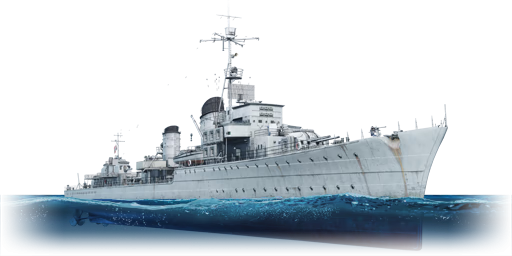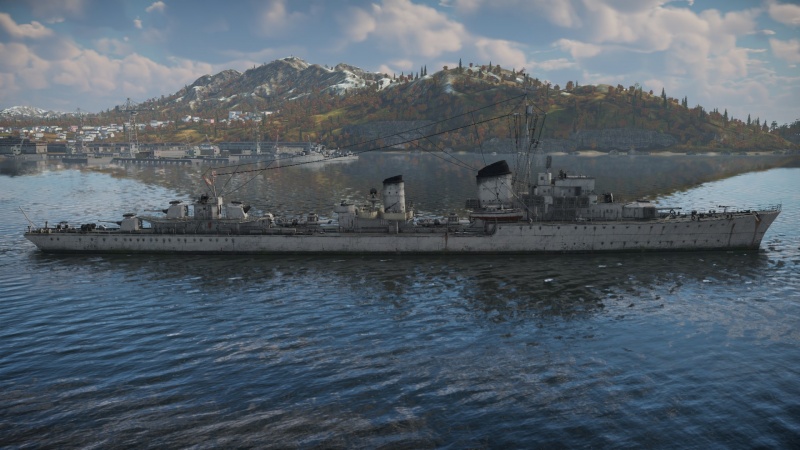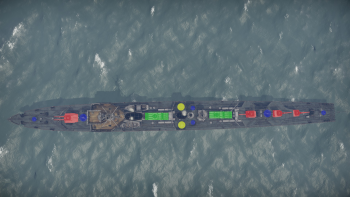Z32
Contents
Description
The Type 1936A (Mob)-class, Z32, 1942 is a rank II German destroyer with a battle rating of 4.7 (AB/RB/SB). It was introduced in Update 1.87 "Locked On".
General info
Survivability and armour
The Z32 offers very little additional protection except the basic hull with 16 mm of steel armour and a superstructure with 8 mm of steel armour. The gun shields on the single 15 cm mounts are 12.7 mm thick and the gun shields on the 20 mm Flakvierlings measure 8 mm of armour, therefore only offering protection from small calibre machine gun fire.
The only significantly armoured part of the ship is the twin 15 cm turret on the front, with around 30 mm of armour frontally and 20 mm on the sides, offering enough protection to resist some early destroyer rounds, thus making it last longer in bow-in engagements.
Having no additional armour means most cannon, autocannon and even machine gun equipped ships can punch through its hull, meaning this destroyer isn't any more survivable than its predecessors in terms of armour.
A small difference, however, is the slightly larger crew complement with 343 men, even surpassing the complement of the Z22 Anton Schmitt with 323 crew, and making this the 3rd highest destroyer crew count after the USS Sumner and the Leningrad.
Mobility
| Mobility Characteristics | |||||
|---|---|---|---|---|---|
| Game Mode | Upgrade Status | Maximum Speed (km/h) | Turn Time (s) | Turn Radius (m) | |
| Forward | Reverse | ||||
| AB | Stock | 61.5 | 23 | ~126.7 | ~240.86 |
| Upgraded | 84 | 31 | ___ | ___ | |
| RB/SB | |||||
| Upgraded | 68 | 25 | ___ | ___ | |
A larger gun calibre whilst retaining the same number of guns as on the regular Type 1936 results in a displacement of 3,597 tons and a speed of around 68 km/h, making the ship slightly slower than its predecessors, although hardly noticeable.
Modifications and economy
Armament
Primary armament
The main armament of the Z32 comes in the form of 5 powerful 15 cm/48 KC/36 cannons, in 3 single mounts aft and one twin mount at the front. The large calibre of these cruiser guns result in a rather slow reload of 7.5 seconds and therefore a maximum of 8 rounds per minute. This however is compensated by the large amount of explosive filler and shrapnel the shells release on impact, as well as the noticeably better muzzle velocity retention, giving a much easier time aiming at longer ranges.
The turret traverse of a mere 10°/sec for the single mounts, and 7°/sec for the twin mount encourages a more careful approach to targets at longer range, as a quick turn with the guns at close range is simply not possible.
The HE shell has a TNT equivalent of 3.91 kg and a muzzle velocity of 835 m/s, making it a great choice for medium ranges against destroyers of any kind.
The second shell type, a semi-armour piercing capped shell, has good penetration, a TNT equivalent of 3.32 kg and a muzzle velocity of 835 m/s. Furthermore, this is the only destroyer shell able to reliably threaten a large portion of cruisers at ranges of 5,000 m. An accurate player will be able to ammorack most early interwar cruisers, or at least cripple them severely.
The last shell, an HE with time fuse, can be used against aircraft if aimed carefully.
| Penetration statistics | |||||||
|---|---|---|---|---|---|---|---|
| Ammunition | Type of warhead |
Penetration @ 0° Angle of Attack (mm) | |||||
| 1,000 m | 2,500 m | 5,000 m | 7,500 m | 10,000 m | 15,000 m | ||
| Spgr. L/4.5 Kz (m.Hb) | HE | 37 | 37 | 37 | 37 | 37 | 37 |
| Spgr. L/4.4 Bdz (m.Hb) | SAPBC | 115 | 97 | 74 | 57 | 45 | 35 |
| Spgr. L/4.5 Zt.Z | HE-TF | 37 | 37 | 37 | 37 | 37 | 37 |
| Shell details | ||||||||||||
|---|---|---|---|---|---|---|---|---|---|---|---|---|
| Ammunition | Type of warhead |
Velocity (m/s) |
Projectile mass (kg) |
Fuse delay (s) |
Fuse sensitivity (mm) |
Explosive mass (TNT equivalent) (kg) |
Ricochet | |||||
| 0% | 50% | 100% | ||||||||||
| Spgr. L/4.5 Kz (m.Hb) | HE | 835 | 45.5 | 0 | 0.1 | 3.64 | 79° | 80° | 81° | |||
| Spgr. L/4.4 Bdz (m.Hb) | SAPBC | 835 | 45.5 | 0.015 | 7 | 3.03 | 48° | 63° | 71° | |||
| Spgr. L/4.5 Zt.Z | HE-TF | 835 | 44.8 | 0 | 0.1 | 3.64 | 79° | 80° | 81° | |||
Secondary armament
The secondary armament is provided with 2 twin 3.7 cm SK C/30 mounts, both in the middle of the ship, one port and one starboard. These have a fire rate of 30 round per minute and provide antishipping capabilities against smaller patrol vessels with HE and AP, as well as minor anti-air support with time fused HE shells.
| Penetration statistics | |||||||
|---|---|---|---|---|---|---|---|
| Ammunition | Type of warhead |
Penetration @ 0° Angle of Attack (mm) | |||||
| 10 m | 100 m | 500 m | 1,000 m | 1,500 m | 2,000 m | ||
| Spgr L/4.1 Lh 37 | HE | 2 | 2 | 2 | 2 | 2 | 2 |
| Psgr L'spur Zerl | APCBC | 87 | 84 | 71 | 58 | 48 | 39 |
| Shell details | ||||||||||||
|---|---|---|---|---|---|---|---|---|---|---|---|---|
| Ammunition | Type of warhead |
Velocity (m/s) |
Projectile mass (kg) |
Fuse delay (m) |
Fuse sensitivity (mm) |
Explosive mass (TNT equivalent) (g) |
Ricochet | |||||
| 0% | 50% | 100% | ||||||||||
| Spgr L/4.1 Lh 37 | HE | 1,000 | 0.75 | 0 | 0.1 | 27.4 | 79° | 80° | 81° | |||
| Psgr L'spur Zerl | APCBC | 1,000 | 0.82 | 1.3 | 15 | 37.4 | 48° | 63° | 71° | |||
Anti-aircraft armament
The main anti-air defence consists of six 20 mm emplacements in total. Four in single mounts distributed in the front, aft and in the middle of the ship, and two quad mounts located in front of the bridge and between the second and third main gun. This gives the Type 1936A decent anti-air capabilities for close range encounters, although for longer ranges, this calibre is insufficient.
Additional armament
The Type 1936A features 2 quadruple torpedo mounts in the middle of the ship, attached in the centre for a full traverse to both sides, enabling a full broadside of 8 torpedoes.
The torpedoes are the standard 533 mm G7a torpedoes of the German navy, with a maximum speed of 81 km/h, a maximum travel distance of 14 km and an explosive warhead of 358.4 kg of TNT. Not particularly outstanding in any kind or form, but still useful for screening capture points or chokepoints and close range panic launching.
Usage in battles
The Z32 is an excellent ship, boasting massive firepower. Due to its non-existent armour, good muzzle velocity, slow firing and slow traversing guns, the Type 1936A is best used on medium or long ranges, where evasive manoeuvres can be made and enemies have a harder time hitting you. Following this, the Type 1936A should not be in the first line of attack, it should be played more like a support, staying further away, and making use of its longer range weaponry. When engaging at close range, the insufficient rate of fire becomes apparent and multiple enemies from different directions can easily overwhelm the slow reacting destroyer, in these situations a precise shot in the ammorack can do the trick and is much more reliable than with smaller calibres. Furthermore, the large calibre is capable to overcome even the anti-fragmentation armour of American destroyers without losing much of your explosive power, and therefore countering those American vessels.
Having the semi-armour piercing (SAP) shell equipped gives the Type 1936A another, more unique role, namely the role of a cruiser killer, being one of the few destroyers to be able to do so. Since your destroyer is the definition of a glass cannon, even more when facing cruisers, it is important to stay concealed behind islands or simply by not shooting whilst closing in to a range of around 4-6 km. A few salvoes into the sides of the cruiser where the ammo is located is usually enough for most early interwar cruiser designs like the USS Trenton, the Krasny Kavkaz, or the Köln.
Pros and cons
Pros:
- Excellent long range firepower
- Powerful SAP round against cruisers
- High explosive mass
- Large crew compartment
- Effective close range anti-air
Cons:
- No hull armour
- Slow turret traverse
- Lacklustre anti-air suite at longer ranges
- Slow firing cannons, every salvo counts
History
Even before the outbreak of WW2, the Naval High Command of the Kriegsmarine was concerned about the firepower of its most modern destroyer vessels. Fearing they may be outgunned by comparable vessels of other nations, a study was initiated in 1936 about the possible upgunning of the Type 1934 and 1936 class destroyers with 15cm main guns.
The study quickly revealed that, although this upgrade was theoretically feasible, in practice it resulted in severe stability issues on the affected vessels and actually hampered their abilities more than increasing them.
However, whilst the Type 1934 and 1936 class destroyers kept their original 12.8cm main guns as a result of the conducted study, the Naval High Command didn't wish to abandon the idea completely and ordered for modifications to be made to the existing Type 1936 design in order to accomodate for the desired firepower upgrade.
This resulted in the creation of Type 1936A which was ordered into production in 1938 and consisted of a total of 8 ships. Although this class was designed to allow for the realization of the desired firepower upgrade, it still suffered from the same problems highlighted by the initial study and was known to have reliability issues with its steam turbines.
In 1940, the first of a total of 7 Type 1936 (Mob) destroyers were laid down. These were designed in an effort to address some of the known issues of the upgunned Type 1936 destroyers as well as to simplify their design in order to allow for shorter construction times.
Only a handful of the upgraded Type 1936A and 1936A (Mob) destroyers were lost in combat during WW2. In fact, more than half of the ships of these two classes survived the war and were used by several allied nations post-war, including the US, UK, USSR and France. The last remaining ships of this class were decommissioned from active service in the late 1950s.
- From Devblog
Z32 herself was lost in an action near Ushant, defeated by the Canadian Tribal-class destroyers HMCS Huron and HMCS Haida on 9 June 1944. She was driven aground and later destroyed by bombs from Bristol Beaufighters.
Media
- Skins
See also
External links
| Deutsche Schiff- und Maschinenbau Aktiengesellschaft | |
|---|---|
| Destroyers | |
| Type 1934A | Kleber** |
| Type 1936 | Z20 Karl Galster · Z22 Anton Schmitt |
| Type 1936A | Z25 · Marceau*** · Z32 |
| Type 1936B | Z43 |
| Type 1936C | Z46 · Z47 |
| Battleships | |
| Nassau-class | SMS Westfalen* |
| *Previously Aktien-Gesellschaft „Weser" | |
| **Z6 Theodor Riedel before war reparation to France | |
| ***Z31 before war reparation to France | |
| Germany destroyers | |
|---|---|
| Torpedo boats | |
| Type 1924 | Jaguar · Leopard · Luchs |
| Type 1939 | T22 · T31 |
| Destoyers | |
| Type 1934A | Z12 Erich Giese · Z15 Erich Steinbrinck |
| Type 1936 | Z20 Karl Galster · Z22 Anton Schmitt |
| Type 1936A | Z25 · Z32 |
| Type 1936B | Z43 |
| Type 1936C | Z46 · Z47 |






